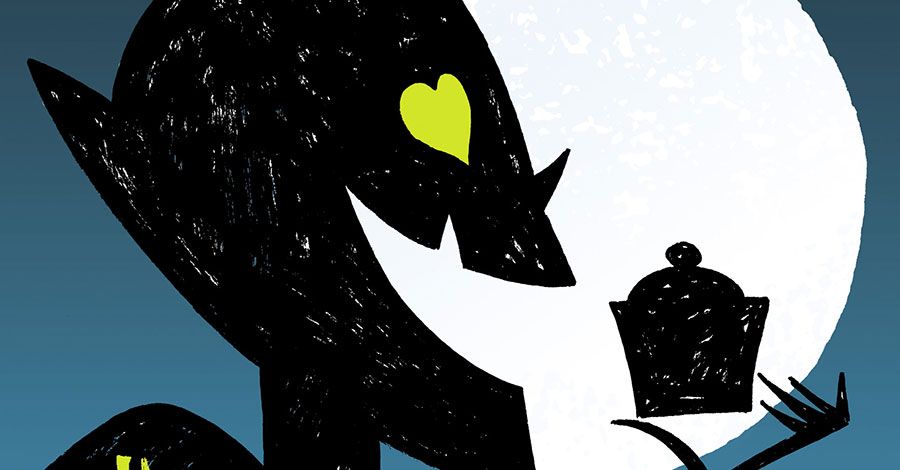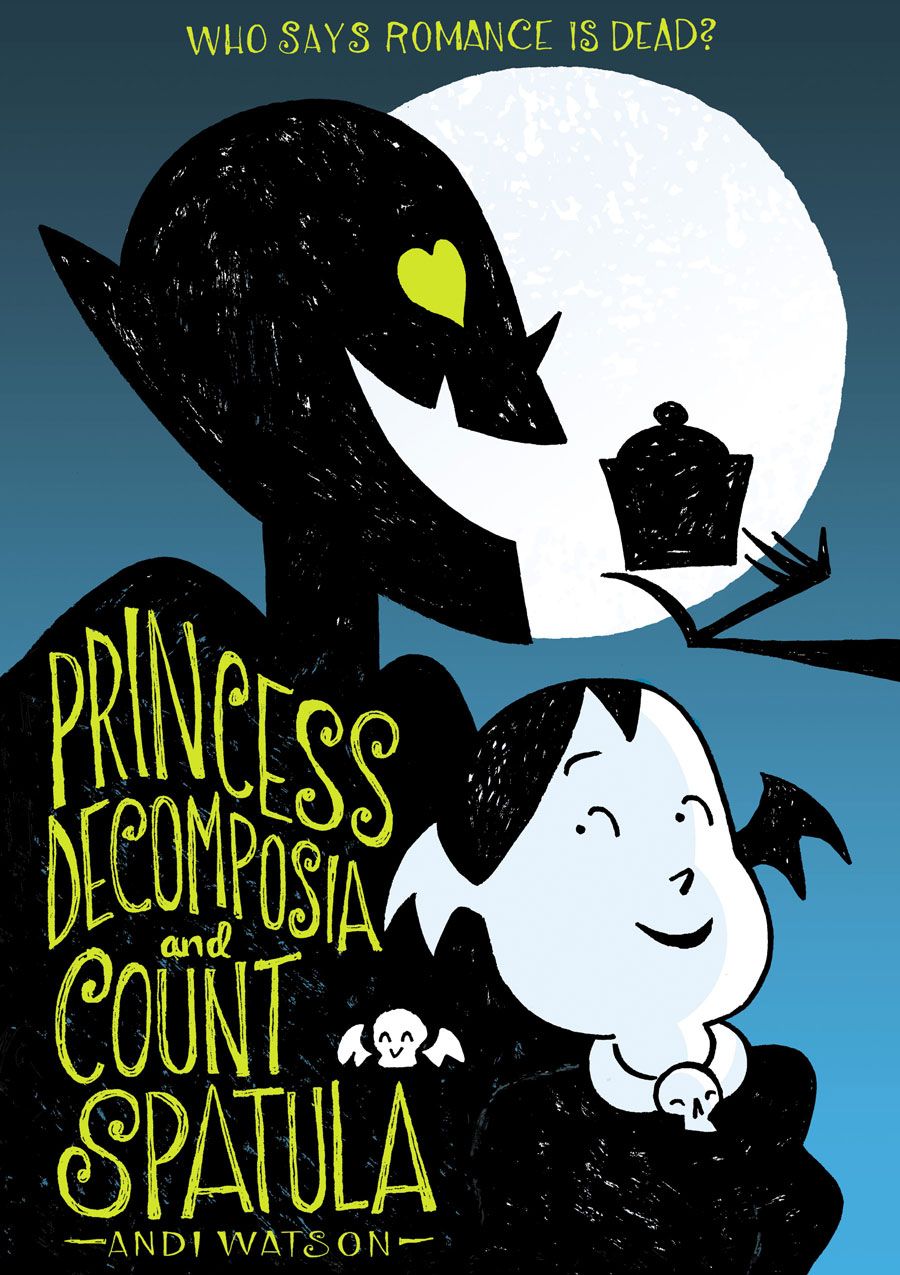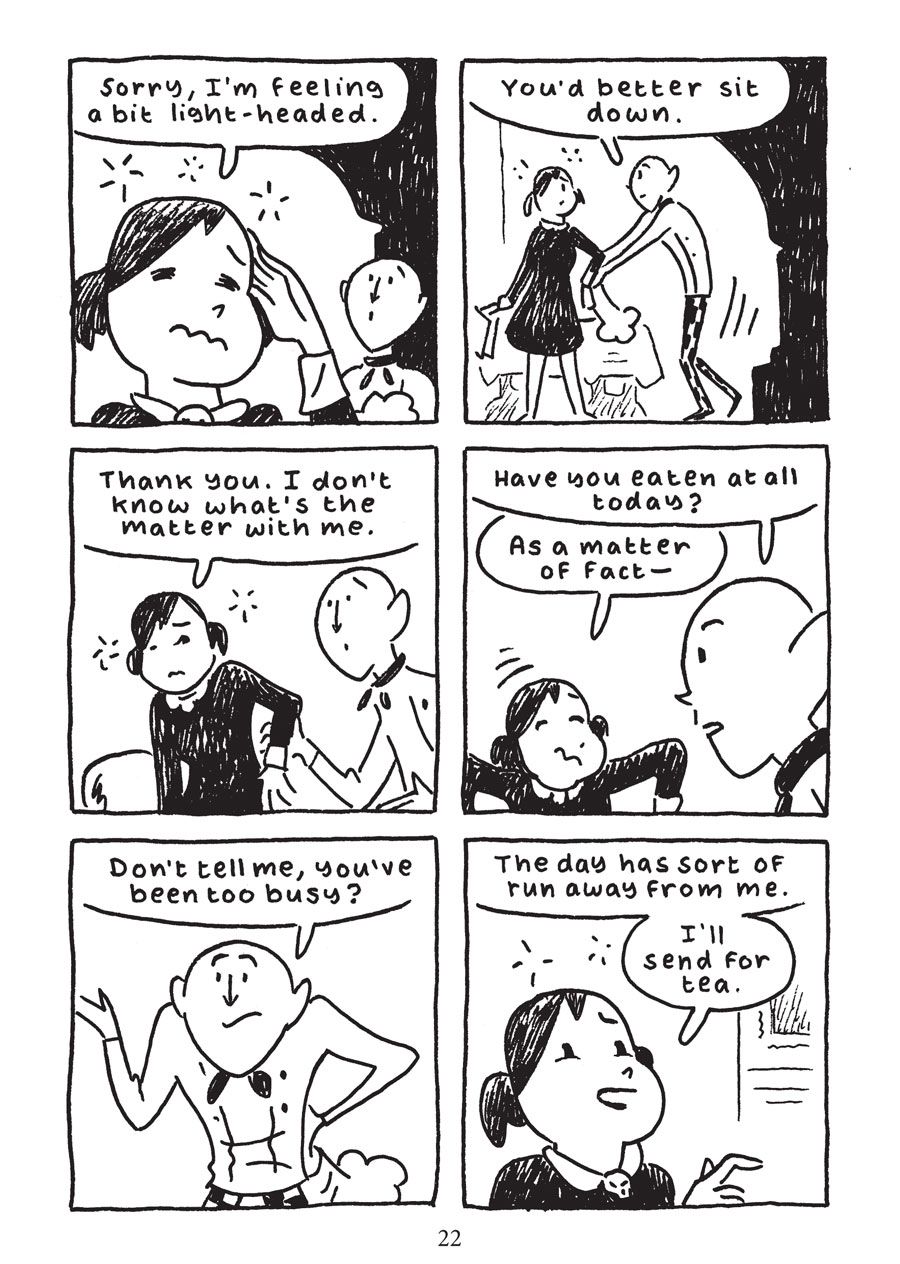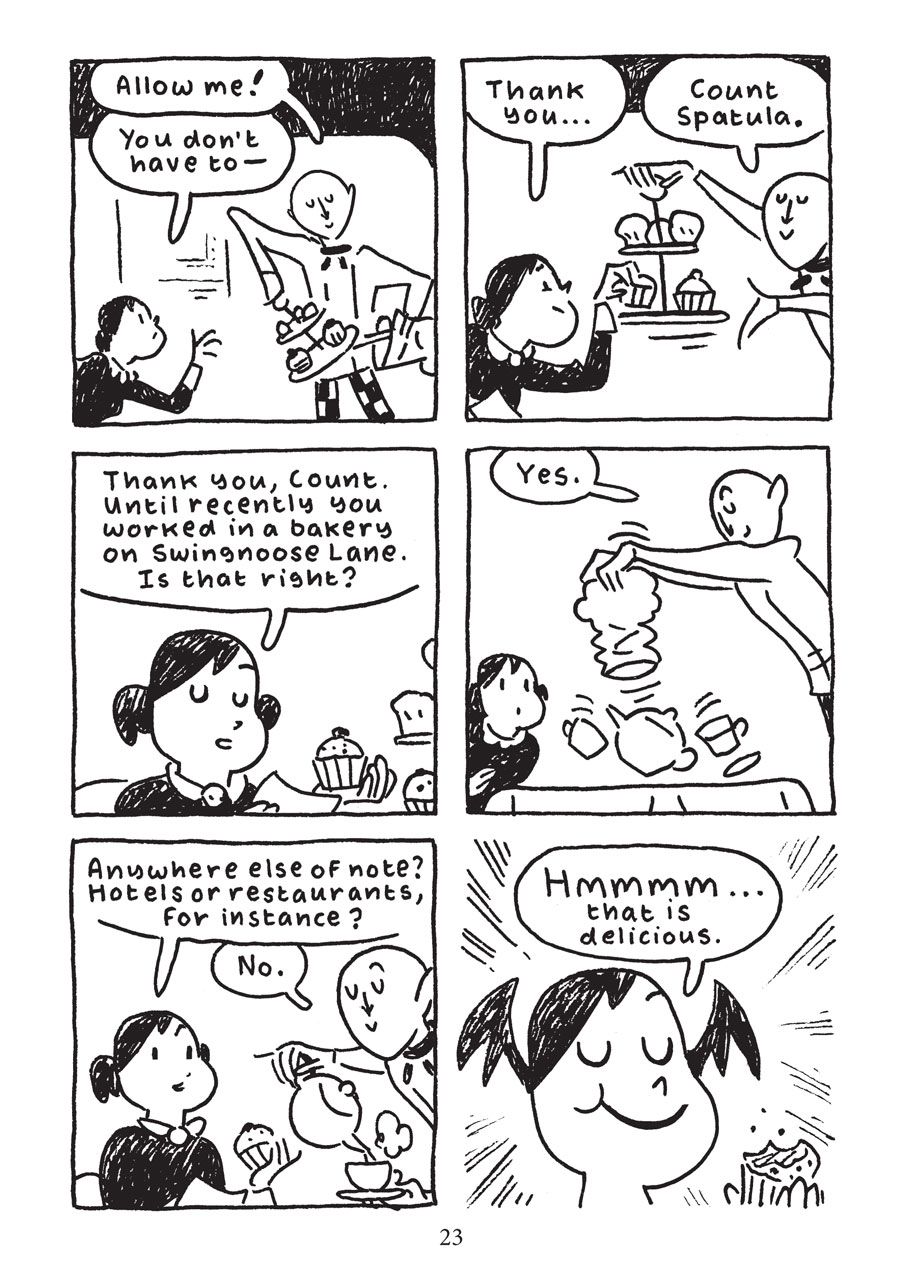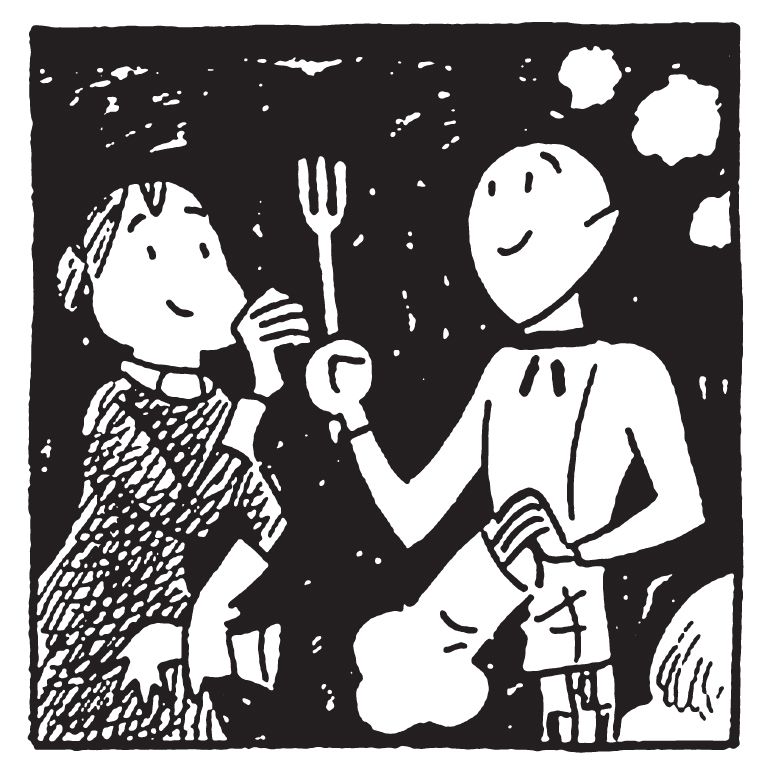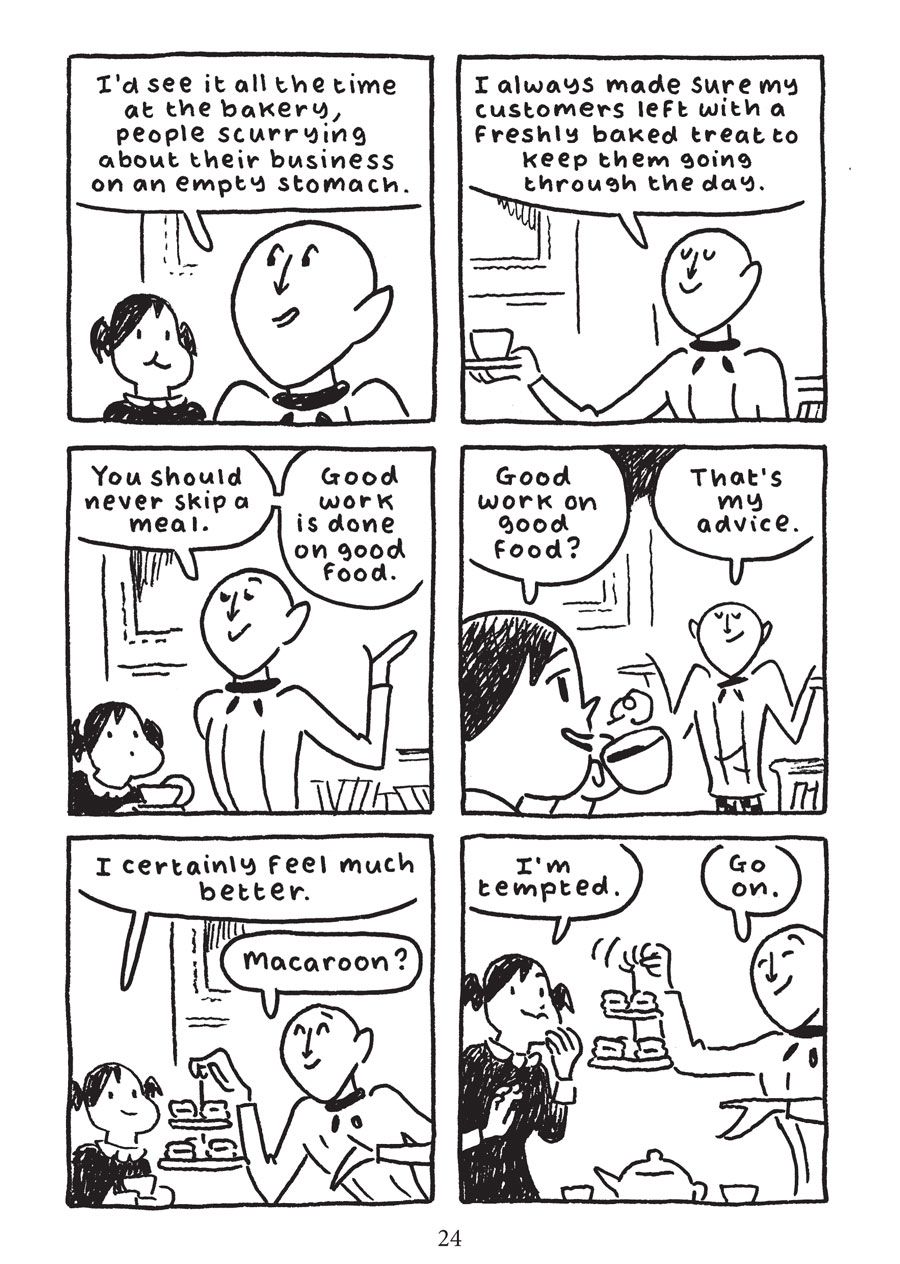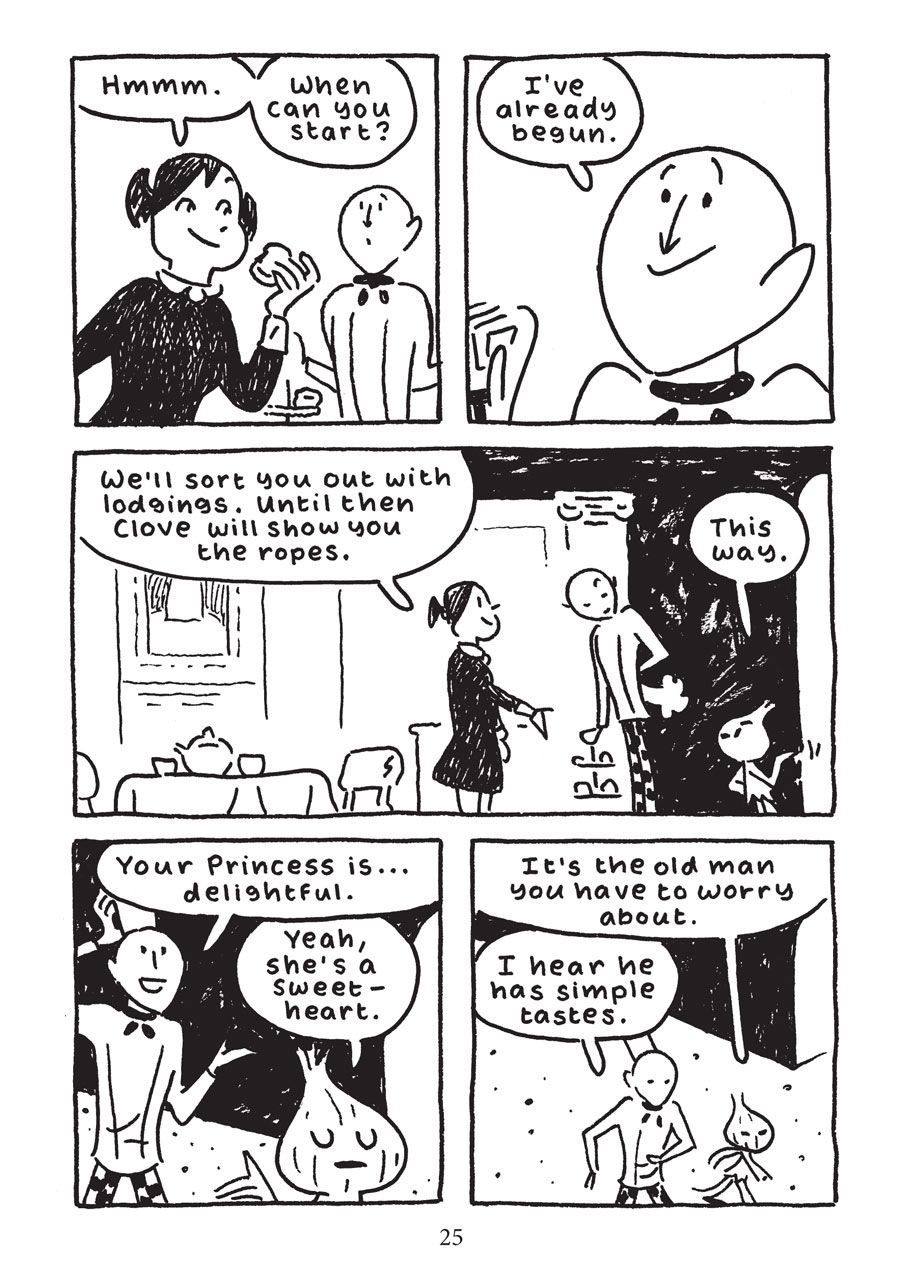Princess Decomposia doesn't have a moment to herself. In addition to running the day-to-day of the Underworld, she waits hand and foot on her controlling, but hypochondriac father, who lies in bed and counts his semi-imaginary maladies. Frequently, she can't even find time for a meal. Then she hires a new palace cook -- Count Spatula, a vampire baker who lost his fangs to his sweet tooth.
Cartoonist Andi Watson's latest graphic novel, "Princess Decomposia and Count Spatula," (First Second Books, Feb. 2015) reveals what happens when the unlikely duo meet and Decomposia begins to take stock of the life she's trapped into leading.
Although he's spent the last half-decade working on a pair of all-ages series in his native United Kingdom, neither of which have (yet) crossed over to the U.S. market, Watson's excited to reintroduce himself to American readers. Longtime readers of Watson's comics, including "Slow News Day," "Breakfast After Noon," and "Skeleton Key," will find his familiar focus on interpersonal dynamics at play along with a playful, all-ages approach to the Underworld and a looser, more ink-laden art style. Watson took some time to discuss "Princess Decomposia and Count Spatula," family dynamics and how quickly time moves in the comic book marketplace.
CBR News: Andi, emotionally true relationships have always played a central role in yours comics, and two main relationships drive this book -- let's talk about Decomposia and her father, the king. What inspired their rather one-sided dynamic?
Andi Watson: Yes, I absolutely am drawn to the characters and relationships in a story. That's what comes to me first, or gets me into a story: who are these people and how do they react to each other? That's where the plot and incidents lead from. Until I feel like I "know" the characters, a book doesn't take off. I have a princess of the Underworld and a baking vampire in this one, but they're no less real to me than the modern day drama stories I've told.
Princess Decomposia was actually a character from my sketchbooks I'd had lurking around for years; initially she was younger, less responsible and more eager to escape the Underworld. I couldn't quite make it hang together, though. When I considered reasons why she would stick around I began to explore the father/daughter relationship and who was the actual adult. Their roles have been reversed so there's a tension. It's a romance story so there's naturally an obstacle that interferes with the lead characters happiness. The king has always been the sort to fuss over his health and one day takes to his bed and never leaves. He's the one who comes between Decomposia and Spatula and is quite manipulative and underhanded in the bargain.
The king is, as you say, something of a hypochondriac and leaves running the kingdom to his daughter Decomposia, although with his domineering behind-the-scenes presence lurking behind her. It's a reversal of the usual father/daughter caregiver/responsibility dynamic, but it also sets up a chance to show how vital the king can still be when Decomposia steps out from under his thumb.
Yes, there's an irony to the King supposedly being the feeble one, but actually controlling via guilt and emotional manipulation. As the story progresses, I think he realizes he's not doing quite as poorly as he thought he was. By the end of the book it's his behavior that has forced Decomposia to assert herself, so there's a happy resolution to the problems he's created. Another aspect of the king's behavior that reflects a contemporary concern is how surveiled children are nowadays. Their online habits are carefully overseen (for good reason) and it doesn't feel safe for them to hang out and play on the street anymore. A lot of their lives are monitored and there aren't as many spaces for them to be free of adult supervision. It's the same for the princess when the king uses Skulker to spy on her. I know what it's like to want to protect your children but I can easily imagine how it might feel oppressive. It's a tricky balance to find and the king's still figuring it out.
You set up a clear contrast when Decomposia meets Count Spatula. What do each of the men in her life show us about the princess?
It's funny because Count Spatula was another character that'd been lurking in my sketchbook for a long time and wasn't working on his own. I even considered using him for a chapter book for a while. It wasn't until I put the count and princess together that the whole thing clicked. Of course the princess wouldn't be the spoiled type, that would be the king. She had the day-to-day drudgery of running a kingdom and being a caregiver. She became more of a Cinderella figure, and I love my fairy tale motifs. The count is the unlikely romantic interest, not the Byronic brooding bloodsucker, but someone who'll care for Decomposia when she's running herself ragged. Baking is in itself a generous act, making something for others to eat and enjoy, so it began to come together. I can't deny the influence of "Emma" by Jane Austen, either. It's one of my favourite books and I have to admit there's a dash of Mr. Woodhouse in King Wulfrun.
You've explored relationships without any genre trappings in the past ("Breakfast After Noon," for example), but you've also used genre trappings to accentuate aspects of a relationship ("Love Fights"). Why did you bring the supernatural element into "Princess Decomposia and Count Spatula"?
I love writing dialogue and character but I also like to draw different things. With straight drama it can end up becoming two or more people talking in a room. It's a formal and technical challenge keeping that visually interesting. The writing part of my brain is all about that stuff, but the drawing part begins to tire after a while. If I can combine the two then it keeps the whole cartoonist in me happy. Drawing palaces, mummies, flying skulls, zombie generals and the like is a blast. Visual invention is as important as the words. If I get to enjoy drawing fresh subjects, the whole process a lot more pleasurable. Waking up and knowing I get to do the page with the giant Mud Monster cake seventy-odd pages into a project is what keeps me engaged.
You've been creating children's books in recent years. How does that compare to straight comics and how much did that work influence your approach to this book?
It's still comics, so there aren't that many differences. I think I have pushed myself to improve my storytelling, making sure it's clearly communicated to the reader. With "Glister" it was quite wordy and I used a style with a narrative voice and captions. With "Gum Girl" it was a lot more visual and, because there are three stories per book, I had to learn to be even more succinct. Comics is all about trying to be as concise as possible. I definitely took those lessons and incorporated them into "Princess Decomposia and Count Spatula."
This book has a much looser style than many of your earlier comics. There's a rawness to each page. Was that a specific stylistic choice for this book? Or an unintended evolution of your drawing style?
I definitely wanted to loosen up a bit, inject more life in the line and enjoy drawing. I'd previously been working on "Gum Girl," which was all rounded shapes, lines that meet and colour gradients with no solid black. "Gum Girl" is a poppy world. The Underworld is stone and shadow so I needed to change my approach. Whereas "Gum Girl" needed a smooth finish, the Underworld is more careworn and I wanted to reflect that in the art. I was itching to use a brush again, so I used a brushpen for blackspotting and to add some texture. I wanted to cut down on my screen time after working in colour and have everything finalized on the page rather than on the laptop. Not only did it make the process more immediate but it was also easier on my eyes.
Another thing I chose to do with the book was go with a three-tier six-panel page. That was a conscious effort to focus on the rhythm of the panels, only breaking it at appropriate points in the story. It also meant I could have fun with the acting and body language of the characters, going moment to moment within a scene.
You don't see a lot of comics driven by relationships. What keeps you mining this vein of internal turmoil in the face of an industry focused on external action?
[Laughs] Yeah, good question. Stupidity, bloody-mindedness? I think it's just the way my mind works. As I mentioned earlier, my way into a story is via character not incident. External action is an abstract in my mind until I know who's undertaking the action, why, how they feel about it, and who else it affects. I'm always getting frustrated with myself but I can't help but tell the stories I tell. I guess it goes back to what I like to draw: people. It's the same whether they're unemployed men in the English regions or royalty of the Underworld. I try and bring them alive on the page.
How did you hook up with First Second for "Princess Decomposia"?
I've had some contact with them in the past. I worked with [Associate Marketing and Publicity Manager] Gina [Gagliano] on "Great Uncle George's Will" for Tor back in 2009 and have always appreciated the range of books they publish. They also do great work with libraries and bookshops and comics stores, so they're helping to grow a new audience of comic readers. They also publish cool stuff like "Anya's Ghost" by Vera Brosgul, so I hoped they might take a look at "Princess Decomposia." I was really pleased when [Senior Editor] Calista [Brill] agreed and even more happy when they wanted to publish it. It seemed like the perfect home for my book and everything moved quickly and smoothly, which was an added bonus. Finishing an entire graphic novel before having a publisher on board was a risk. I tried not to think about what would happen if I completed the thing and couldn't find a home for it. Luckily, I'm used to ignoring the common sense voices in my head; I'm a cartoonist.
You've also, in recent years, been working on your all-ages series "Gum Girl" with British children's book publisher Walker Books. Is that series still ongoing? What else are you working on?
"Gum Girl" was a lot of work but also a lot of fun. There're four books currently available and, as with all good superheroes, the potential is there for more. I'd actually love for a publisher to pick up the U.S. rights and put it out. In total it's 240 pages of work, so there's a lot of really fun comics people might have missed out on. By the fourth book, "Music, Mischief and Mayhem!," I was getting to play with the comic book form too -- one story involves having the color stripped out of it while the other is "silent" when Mime Man hits town. It'd be great to have a complete "Glister" volume out as well; again, that's a good 250 pages of comics that people in the U.S. might not have come across.
Otherwise, I'm finishing up writing a new spooky graphic novel that I'm looking forward to drawing. My webcomic series "Princess at Midnight" is done and finishes early in the new year. It's a "Game of Thrones" for kids and I hope to find a publisher for that. Also, I've completed a graphic novel for grown-ups, more like the work I was doing on "Breakfast After Noon," and hope to find a home for that soon.
"Gum Girl" and "Glister" haven't had much penetration in U.S. markets, so this is your first major work in the States since "15 Love" in 2011. With First Second's ability to reach new comics readers, you'll hopefully find new readers who've never read "Geisha" or "Skeleton Key" or any of your earlier comics. How does it feel to (re)introduce yourself to U.S. readers after a few years away?
That's right, the "Gum Girl" and "Glister" books haven't been fully published in the U.S. yet. Image did put out early versions of the first three "Glister" books in 2007 and, apart from "15 Love" (which was work-for-hire), I haven't had anything new out. In the fast-moving world of comics, that was a mistake. I really wish I'd tried harder to juggle the U.K. work and still remain active in the American market. I didn't and so I think it's been very easy to slip from view. "Princess Decomposia" will be released early February so it will have been a good seven years or so without a U.S. presence.
That's an epoch in comics-time. I can't blame anyone for thinking I'd "disappeared"! So, yeah, I'm hoping to connect with brand new readers and also reacquaint myself with old ones. First Second are really active at marketing their books so I'm sure that will help. I'm excited about the new book, have lost none of my appetite for creating new work, have already finished a couple of books which are looking for publishers, and so I can safely say I'm happy to be back and readers can look forward to enjoying lots of new comics.
"Princess Decomposia and Count Spatula" hits stores in February from First Second

